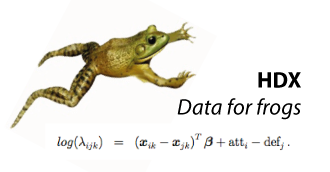NOTE: This data is for working and demonstration purposes only. It should note be trusted as authoritative data or alike. For more information get in touch with the HDX team here.
Here you can find 155 indicators from 24 sources that are now part of the Common Humanitarian Dataset. The folder frog-data contains data in two formats: CSV and SQLite. The data is organized as follows:
-
CSV
- value.csv
- indicator.csv
- dataset.csv
- denorm_table.csv
-
SQLite
- cps_model_db.sqlite (3 tables like the CSV files above, value, indicator, and dataset)
- denormalized_db.sqlite (single flat table)
We have just defined a new coding scheme for the indicators. Documentation for the new coding scheme can be seen here.
You can find prepared data in the frog_data folder. Here are the four files you find there with their respective descriptions:
-
value.csv: Value contains the actual observational data. There are 7 fields in this file:
- dsID: Unique identifier of the "source" of the data.
- region: The country / territory the data is about.
- indID: The unique ID of the indicator in our data model.
- period: The time period the data is about. Usually a four-digit year.
- value: The value of the observation / record.
- is_numer: A boolean that explains if the observation is a number.
- source: The source (link, generally) of the data.
-
indicator.csv: Here you find a list of the indicators in the database, together with their names and type of data.
- indID: The unique ID of the indicator in our data model.
- name: Long name of the indicator.
- units: The type of data that observation is about.
-
dataset.csv: Here you find information about the sources of the data.
- dsID: Unique identifier of the "source" of the data.
- last_updated: The last time the data has been updated at the source level.
- last_scraped: The last time the data has been scraped.
- name: The long name of the source.
Note: UNHCR data is not included in these files as it doesn't quite fit the data-model yet. (It isn't on CPS).
You can also access the denormalized database (limited to 1000 entires, so not the full database) using a RESTful interface in this link: http://www.databeam.org/luiscape/local/data-for-api.json
Here is a query example: http://www.databeam.org/luiscape/local/data-for-api.json?column=indid&api_key=api-key
Result:
[
{
"dsid": "acled",
"indid": "PVX040",
"region": "SSD",
"period": "1999",
"value": "224",
"is_number": "0",
"source": "http://www.acleddata.com/data/types-and-groups/",
"indicator_name": "Incidence of Conflict",
"units": "incidents per year",
"last_updated": "",
"last_scraped": "2014-06-15T19:03:08.535497",
"source_name": "ACLED (Armed conflict location and event dataset)"
},
{
"dsid": "acled",
"indid": "PVX040",
"region": "GNB",
"period": "2002",
"value": "10",
"is_number": "0",
"source": "http://www.acleddata.com/data/types-and-groups/",
"indicator_name": "Incidence of Conflict",
"units": "incidents per year",
"last_updated": "",
"last_scraped": "2014-06-15T19:03:08.535497",
"source_name": "ACLED (Armed conflict location and event dataset)"
}, ...You will need an API key to use that. Reach out to me if you are interested in using the API.
API created using DataBeam.
Alternative API From Parse
- Fetch all indicators: http://ocha.parseapp.com/getindicators
- Fetch dataset by indicator 'FY010': http://ocha.parseapp.com/getdataset?indid=FY010
